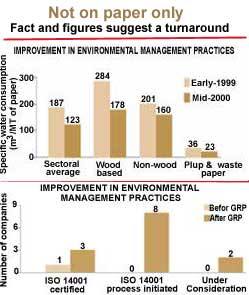Turning over a new leaf
 All pulp and paper production plants with more than 100 tonnes per day (tpd) production capacity were shortlisted for the rating that was announced on July 18,1999. The sample comprised 28 production units of 23 companies spread across 13 states. Overall, the sector recorded a dismal performance with only two production units getting the 3 leaves award. Thirteen were in the 2 leaves category, while 12 managed only 1 leaf. One was not ranked for its failure to fulfil the eligibility criteria. The paper sector rating highlighted the importance of proper natural resource pricing for better efficiency. It was also noticed that the debate on the use of chlorine-free bleaching had passed unnoticed.
All pulp and paper production plants with more than 100 tonnes per day (tpd) production capacity were shortlisted for the rating that was announced on July 18,1999. The sample comprised 28 production units of 23 companies spread across 13 states. Overall, the sector recorded a dismal performance with only two production units getting the 3 leaves award. Thirteen were in the 2 leaves category, while 12 managed only 1 leaf. One was not ranked for its failure to fulfil the eligibility criteria. The paper sector rating highlighted the importance of proper natural resource pricing for better efficiency. It was also noticed that the debate on the use of chlorine-free bleaching had passed unnoticed.
The pulp and paper industry was found to devour natural resources and emit a large proportion of these in the form of waste during the production and disposal stages. GRP's other revelations included the rampant use of obsolete technology and the small size and capacity of the Indian mills.
A year after the release of the rating, representatives of pulp and paper companies met the GRP unit at a workshop organised by the Centre for Science and Environment to take stock. The feedback given by them was very encouraging:
• In the short span of a year, many companies have begun to alter their policy of buying wood from natural forests and have moved towards farm forestry. The sourcing from farm forestry has increased by 20 per cent.
• Water consumption, which was as high as around 250 cubic metres per tonne of paper produced at the time of the rating, has gone down by 16 per cent (see graph: Not on paper only ).
• Twenty-three per cent companies have stopped using elemental chlorine, which is non-biodegradable.
• There are now three companies with International Standards Organizations (ISO)14001 certification as compared to only one earlier. Eight more are in the process of obtaining the same. ISO 14001 is an environmental management systems (EMS) benchmark awarded to companies that meet the stipulated requirements (see graph: Not on paper only) .
The impact of the project on the pulp and paper sector only goes to show that economic liberalisation and privatisation do not cause environmental damage, provided the civil society is encouraged to act as a watchdog.
Related Content
- Interconnected disaster risks: Turning over a new leaf (2025 report)
- 'Transformed' Chambal dacoits join fight against deforestation
- India State of the Environment Report : The Monthly Overview, September 2013
- Kerala tea estate turns a new leaf with mid-day meal scheme
- Forest fires aid in the spread of mercury in soil
- CP-Dwarka trial run begins today
